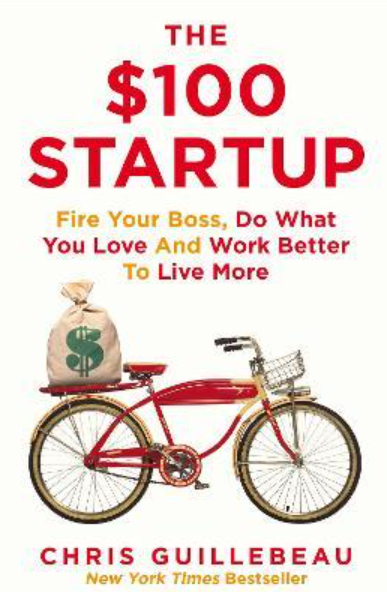Chris Guillebeau’s second published book: The $100 Startup is his most well-known and his cling to fame. After writing his first book on the Art of Non-conformity, he took a more practical approach to develop an interest in entrepreneurship and side hustle culture.
More and more people are looking for creative ways to make an income, especially since the remote work model has ultimately proven itself. Whether looking to build a full-fledged business or just need ideas on making extra money to complement your full-time opportunity, this may be the only book you need.
The $100 Startup Summary
True to its name, The $100 Startup is the culmination of research and interviews with 1,500 different successful startups, with a heavy focus on 50 ideas in particular. As you may have guessed, these 50 most relevant cases only contained a very small investment, often less than $100.

The number is so nominal that even if startup costs slightly vary, they will be accessible to the majority of readers that are looking for low-cost ideas to invest their time and money in.
The $100 startup contains a framework and guide that speaks on step-by-step plans and actions to find the intersection between your passion and your skills. After all, you would need to be looking for a job, you are trading your skills for compensation, and you must enjoy what you do at the very least.
Best ideas from The $100 Startup
Chris deep dives into the best businesses that can be done with nothing more than an initial investment and a laptop, in the comfort of your own home. Let’s go over the most important takeaways below.
A Thriving Business Focuses On Skills, Customers, and Passion
While some business philosophies urge you to dive headfirst into your passion and turn it into a profitable venture, most businesses fail. This is not to frighten people, but becoming a statistic is usually because most are not prepared to take what we like to do and turn it into a functional business.
The level of unpreparedness goes down drastically when a business starts as more of a side-hustle, and regular income can be kept during this time, if possible. This provides a cushion for your ideas and the ability to test the market before jumping in.
Chris goes on to talk about the sweet spot where passion meets skill. When you take something very interesting to you, can execute it better than most, and most importantly, can solve a problem for the client or customer, you have a running business. As long as people are willing to pay you and you have a method to transact that payment, your business can get off the ground.
Carefully identify your passions from your hobbies, which will be talked about more in detail below. For example, you may love to try new recipes and cook elegant meals, but are you comfortable mass-producing said meal in a high-stress commercial kitchen, and handling shipping?
Hobby vs Business: What’s The Key Difference?
A natural segway from the above point becomes identifying the difference between a hobby and a (passionate) business. The key difference is someone’s willingness to pay. the only difference between the words “amateur” and “professional” is the latter has received payment for their service while the amateur has not. Ask yourself if you are prepared to take your hobby to the next level and envision what that entails, when that is done, you can move on to starting a business.
After this is decided, start a “microbusiness” identifying income sources and costs, as well as funding opportunities.
Luckily, the book speaks about startups that can be done for $100 or less, and if your idea costs more, crowdfunding campaigns such as Kickstarter and GoFundMe can be a great way to take pre-orders and market testing before a product-centered business once an MVP has been complete.
At first, your income and costs are dependants on your ability to work hard and make strategic choices and partnerships. When first starting, a proven way of getting clients and customers is to provide a free demonstration of your ability, as well as ask larger partners if they have any contracts available that are too small or time-consuming for them to take.
When considering your costs, regardless of what gurus say, you do not need anything fancy, such as a stunning website, flashy business cards, and other extra fluff. Anything that is not a direct sales activity in the beginning stages should be tabled for later.
Be Lean; Act More, Plan Less
Chris’ method closely resembles that of the popular “Lean” business strategy that aims to fail as fast as possible. Designing an MVP (minimal viable product) or your product or service description is necessary but should be taken to market as fast as possible for market research.
When communicating to clients, focus on a statement for your services that can be summarized in one sentence. There are only three things that are needed to be said for effectiveness: What solution do you provide, the target customer, the cost, and the method of payment. An example is below:
“I generate 50 more effective leads for roof contractors monthly for $1500 via e-transfer”
Be aggressive in your SMART goals and targets, and cut down on social media and “friendly” advice. Everyone will always give their opinion around you and what you should be doing. Unless you have chosen a dedicated mentor, focus on your business and do not compare yourself to anyone else or listen to unsolicited advice.
The $100 Startup Review & Should You Read It?
This book summary is unique in that it cannot list the entirety of the ideas presented in this book. It is recommended to do a full read-through to obtain the necessary step-by-step instructions on business success. Remember that you can grow this as small or as big as you need it.
Some are looking to build a large traditional business and others that would like to automate a one-person online business to have alongside their primary income. In this way, this book can be recommended to everyone, as we all will need to make professional wealth choices in our lives.
Summary
The $100 startup has been compared to a similar well-known predecessor the 4-hour workweek. Tim Ferris is widely known as the titan of the self-help and finance genre but focused more on living an automated lifestyle rather than an instructional manual towards business success.
Further reading into this book will bring enlightenment on more things such as cheap and effective marketing strategies, options for scaling, and pricing on value rather than focusing on being the cheapest. Start your $100 journey for a fraction by picking up a copy of The $100 Startup.

